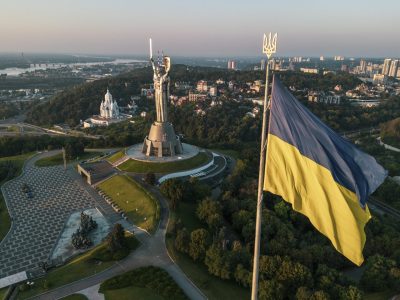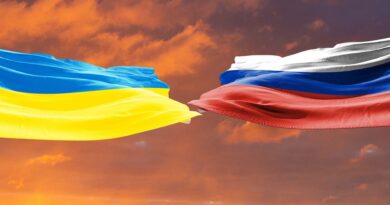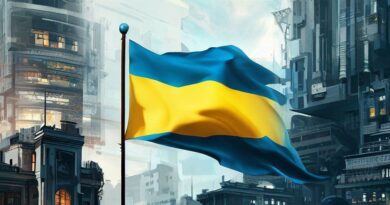“Victory Plan” as a Tool to Realize Ethnocratic Fantasy in Ukraine

The Ukrainian President Volodymyr Zelensky failed to gather much support from European allies last week but he nonetheless announced his quite grandiose “Victory Plan” yesterday during his delivery to Ukraine’s Parliament. “The future for Ukraine is, without a doubt, to be a strong part of the global world, to stand as equals with all leading nations, to be a full-fledged member of the European Union and NATO”, he said.
The whole thing of course largely depends on Western willingness to help implement it, thereby dragging the Atlantic Alliance into the conflict, as he reiterated over and over: “For us, it is entirely legitimate to turn to our partners for support in this battle”. Much is being said about the 5 points Zelensky presented, but is worth analyzing the ethno-national premises behind this idea of the “glory of Ukraine” which makes it worth to sacrifice so much and to face (and to impose) the risk of a NATO-Russian conflict:
Claiming that “Russia must lose the war against Ukraine. And this is not a ‘freeze’. And it is not trading Ukraine’s territory or sovereignty”, the Ukrainian leader in his Victory Plan speech said quite eloquently that his country seeks “to live independently, to live freely, sovereignly, on its own land and by its own laws.”
This last bit sounds fair enough and of course normally any state will defend its territorial sovereignty. But it is also true that over the course of history territorial transformations, with gains and losses, take place. And it is also true that today’s Ukraine is a kind of inflated state, territory-wise, due to well-known Soviet policies. Parallelly, Russia has lost lots of its territory.
In fact, in post-Soviet Eastern Europe and the Caucasus region (just as in post-colonial Africa), the overall situation with borders is far from being a settled matter, and is still a kind of unresolved issue, with a number of frozen conflicts and unrecognized countries and/or states who have disputed or limited recognition. Suffice it to mention the cases of (none of them having direct Russian involvement in terms of claims) Transnistria (claimed by Moldova), South Ossetia and Abkhazia (both claimed by Georgia), the Armenian exclave of Nagorno-Karabakh or Artsakh (recently occupied by Azerbaijan).
So Ukraine, within this larger post-soviet context, is not at all alone in that matter, and Crimea and Donbass have been a hot topic for decades. One must keep in mind the fact that the Ukrainian state has been bombing the Donbass region, in what was (until 2022) often described as Europe’s “forgotten war” – one can only imagine what it would do with that region and its inhabitants in a Kyiv victory scenario.
Moreover, consider this: in a survey taken six months before the 2022 conflict erupted, over 40 percent of Ukrainians nationwide, “and nearly two-thirds in the east and south”, agreed with Putin that Ukrainians and Russians are “one people.” For centuries, Ukrainian identity has really been part of a larger Russian identity, and to this day, millions of Ukrainians think of the categories “Russian” and “Ukrainian” as being somehow aligned and compatible – and not fully separated.
Writing in 1994, political scientist Ian Bremmer, predicting the Donbass war, warned that if Kyiv’s nation-building policies alienated too much the country’s “ethnic Russians”, there was potential for internal conflict. Today Nicolai N. Petro (a professor of political science at the University of Rhode Island) warns about minority civil rights problems in the country that “relegate Russian speakers to permanent second-class status.”
And this is part of the core of the issue. In his 2023 academic article called “On peoples, history, and sovereignty”, Chris Hann (a Director Emeritus at the Max Planck Institute for Social Anthropology in Halle) makes a distinction between “historical” and “non-historical” peoples – this does not imply, it should be stressed, any kind of “inferiority”: “historical nations” would be merely those that possess a long tradition of statehood and clearly defined national identity. The ethnologist is far from being a “Putin supporter”, but he emphasized that “much of the international coverage of the Ukrainian case naturalizes a Ukrainian people/nation”
Whether one likes Putin or not, when he talks about the relative novelty of the independent Ukrainian state, he is just stating historical facts. In the early nineties, Mark von Hagen, in a paper titled: “Does Ukraine Have a History?”, wrote the following: “today’s Ukraine is a very modern creation, with little firmly established precedent in the national past.” He wrote about the risk of an “overemphasis on [Ukrainian] nationalism and ethnicity to compensate for previous underemphasis.”
Similarly, Kataryna Wolczuk, in chapter two of her 2001 book “The Moulding of Ukraine” writes that: “Ukraine’s history does not lend itself to configuration as linear national history… Post-soviet Ukraine lacks the ‘historical legitimacy’ derived from distinct and ‘identifiable’ institutional traditions and stable territorial boundaries.”
This has been the country’s political elite project in the making since the nineties – and this took a sharper turn in 2014. The problem is that the ethnocratic manner this nation is imagined is problematic to say the least and it is being built in a way that potentially (according to Nicolai N. Petro, writing for Foreign Policy) simply alienates and excludes a large part of its population – not to mention neighboring allies such as Poland.
In any case, objectively speaking, whether one likes him or not, Zelensky simply does not seem to be up for the task of being a great statesman. He is rather the inexperienced politician (the “comedian-turned President”), and a de facto dictator who has banned all opposition – and yet at the same time a weak leader who is hostage to armed ultra-nationalists and neo-fascists. For that reason, Ted Snider, writing for Responsible Statecraft, argues quite convincingly he is in no place to negotiate peace either.
All things considered, with today’s Ukrainian leadership and state of affairs, the task of nation-founding with all its territorial ambitions for a Greater Ukraine does not seem to be achievable. And if somehow such a goal were to come through (the way it is envisioned today) it would not really be a desirable outcome in terms of local security and stability or the human rights of a large part of the population of Ukraine and its disputed territories. Without addressing these ethnopolitical issues and the dangers of NATO enlargement, there is little hope for peace in the region.
*
Click the share button below to email/forward this article to your friends and colleagues. Follow us on Instagram and Twitter and subscribe to our Telegram Channel. Feel free to repost and share widely Global Research articles.
Birds Not Bombs: Let’s Fight for a World of Peace, Not War
This article was originally published on InfoBrics.
Uriel Araujo, PhD, anthropology researcher with a focus on international and ethnic conflicts. He is a regular contributor to Global Research.
Featured image source


